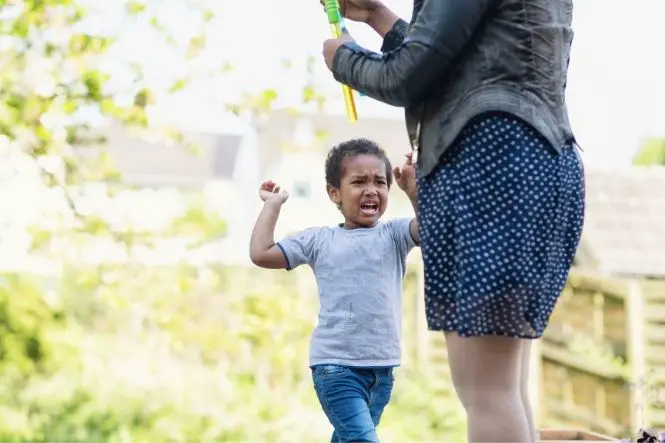At some time most children get the bright idea that holding their breath will force their parents to give them something that they want. Usually these threats are harmless and bring no results, but occasionally when a child becomes upset (s)he will have a breath holding spell (BHS) that results in purple skin tone and even sometimes leads to losing consciousness and may be accompanied by seizures. Breath holding spells can be terrifying for both the child and witnesses, but usually bring no long term effects. Please read on for answers to some frequently asked questions about children and breath holding.
Table of Contents
How Common are Breath Holding Spells (BHS)?
About 5% of children engage in breath holding spells. There are no warning signs or indicators that a child may engage in breath holding spells. Even genetic links such as, a sibling who engages in breath holding spells will not necessarily correctly predict that their sibling will do the same .
When Do Breath Holding Spells (BHS) Begin?
Breath holding spells generally begin sometime during the “terrible twos” and die out before a child’s fifth birthday. Breath holding spells are rarely seen in children under the age of one year, and rarely after children over the age of six years.
What Happens During a Breath Holding Spell (BHS)?
Breath holding spells usually occur when a child is upset and angry. Often the child will throw what begins to look like a temper tantrum, but cut short the screaming or crying with a breath holding spell. For several seconds it may look as though the child is still raging though no sound accompanies the actions. Children may turn blue or purple during the spell, children may pass out for a few seconds and a seizure may accompany the spell. Some children may also turn abnormally pale while they are unconscious. Thankfully, children are rarely harmed by a breath holding spell or an accompanying seizure other than if the child injuries him/herself during a fall.
Should a GP be Consulted About Breath Holding Spells (BHS)?
If a child loses consciousness for any reason a GP should be consulted. If a GP does diagnose a breath holding spell, (s)he will likely offer parents further information on the behaviour.
How Should Adults Deal with Breath Holding Spells (BHS)?
If a GP has diagnosed breath holding spells and they have become routine, parents should ignore their child’s behaviour once they have ascertained that a child was not hurt or injured during a spell. Much like a temper tantrum, a breath holding spell is a method by which children seek attention or a more favourable outcome to a situation, so rewarding the behaviour by giving the child attention or the more favourable outcome will only reinforce to the child that the behaviour is a means to an end. Instead, adults must show children that their behaviour is unacceptable and will not net them any results.
Breath holding spells (BHS) can be frightening for adult witnesses, but they rarely harm the child involved. Breath holding spells should be diagnosed by a GP, but once it is established that a child is engaging in these spells, they should not be rewarded for these behaviours. Most children grow out of breath holding spells by the age of five or six years old and very few suffer any long term effects from these behaviours.



